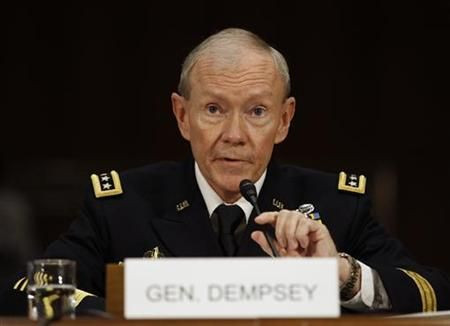Women In Combat Units Could Help Reduce Sexual Assaults: US Joint Chiefs Chairman

Lifting the military ban on women in combat will not only open hundreds of thousands of frontline jobs to female soldiers. According to Chairman of the Joint Chiefs of Staff Martin Dempsey, it could be a key step toward reducing the ongoing problem of sexual harassment and assault in the armed forces.
The Department of Defense officially rescinded the 1994 Direct Combat Definition and Assignment Rule that closed off combat units to women. Lifting the restriction will open about 250,000 jobs to female service members, who currently make up about 15 percent of U.S. military forces.
While speaking at the official announcement of the change on Thursday, Dempsey denied that adding women to those roles, as some primarily conservative critics have suggested, would hinder the efficiency of combat units and even "humiliate" male soldiers. Dempsey told reporters he believes giving women larger roles in the military has historically improved the quality of the institution, and expressed his hope that integrating combat units could empower female soldiers.
“We’ve had this ongoing issue with sexual harassment, sexual assault. I believe its because we’ve had separate classes of military personnel at some level. Now, it's far more complicated than that,” Dempsey said. “But when you have one part of the population that is designated as ‘warriors’ and one part that is designated as something else, that disparity begins to establish a psychology that, in some cases, led to that environment. I have to believe the more we treat people equally, the more likely they are to treat each other equally.”
According to Dempsey, integrating women into combat units could be a transformative step toward changing a military culture that may, even unconsciously, encourage sexual crimes.
About one in three military women have been sexually assaulted -- double the rate of civilian women, the Department of Labor’s Women’s Bureau reports. More than 3,100 sexual assaults, primarily victimizing women, were reported in fiscal year 2011. The number of actual attacks is likely much higher, according to the Department of Defense, which estimates only a fraction of victims reported the assaults.
The majority of sexual assaults are committed against service members by service members. A “vast majority” of those victims are female junior enlists under the age of 25, according to the Pentagon’s Sexual Assault Prevention and Response Office, while most of the perpetrators are older, generally higher-ranking males.
The epidemic of sexual violence among the armed forces has made headlines in recent months after it was revealed 59 military recruits had been abused by drill instructors at Lackland Air Force base in San Antonio, Texas. The U.S. House of Representatives this month agreed to hold a hearing on the unfolding scandal.
© Copyright IBTimes 2025. All rights reserved.





















